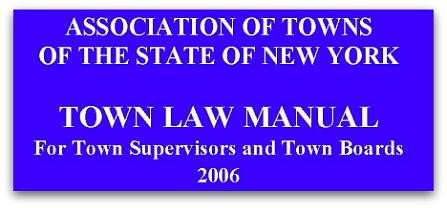As a taxpayer, you do yourself a disservice if you are not familiar with this publication.
The NYS Association of Towns publishes a Town Law Manual which is the virtual bible for town governments throughout the state. Every town which is a member of the Association of Towns receives copies of the Manual. Copies are typically given out to new board members on taking office. (The Association is a private organization, by the way, founded in 1933. It does not receive state or federal monies, and there are annual membership dues charged to each town.)
(Village governments, on the other hand, typically join the NYS Conference of Mayors, which provides advice through its Handbook for Elected Village Officials and its Handbook for Village Officials.)
Back to town governments. Have you ever noticed your town supervisor hauling out a little, fat blue book and thumbing through it? Or ever asked yourself, “Gee, where does my town board learn how to conduct town business?” The answer is, the Town Law Manual.
Chances are good your town is a member of the Association of Towns—meaning that you, as a taxpayer, should have ready access to the Town Law Manual. Because the Manual has become the chief authority on municipal governance, you need to be able to consult it when you have a question about the legitimacy or accuracy of a board’s procedures or conduct. Ask your town supervisor for a copy, on the grounds the town board used your money to join the Association. (Remember, the board represents its taxpayers.)
Even as you consult the Town Law Manual bear in mind that what you are reading is not an official state document; it is a gloss (advice & opinion) on state law, written by a private organization representing your town. (Note that towns in NYS are defined as “general purpose, home rule municipal corporations.”)
Another service provided by the Association of Towns is a model Code of Ethics. Download and compare it to your town’s Code of Ethics—if it has one. (Many towns have none.) Suggest to your town board that it update its Code by bringing it in line with this one.
Likewise, if you read your town Code of Ethics and find it (a) largely unintelligible (good rule of thumb in life: if something doesn’t make sense to you, chances are high it’s nonsensical or deliberately deceptive) or (b) sidesteps the critical matter of Conflicts of Interest, suggest that your board scuttle the old Code and replace it with this one. The model Code is clear on Conflicts of Interest and what “recusing” oneself entails. (Notice it requires more than merely abstaining from voting; “recusal” means abstaining from any participation whatsoever in a matter where a town officer has a vested interest.)
(Note to Burke residents: Compare Brian Stewart’s Code of Ethics to this Model Code of Ethics. Then ask yourselves [a] which one is clearer? [b] which one straightforwardly, in plain English, confronts Conflicts of Interest without playing word-games? [c] which one is briefer? [d] which one was free—presumably Mr. Stewart charged the town for his handiwork?)
None of this is meant to suggest North Country town boards (including zoning boards, planning boards, etc.) are doing a shoddy job. They generally do a fine job, and we are all beholden to them for their dedication and hard work. Even the best of boards will blunder on occasion, and when this happens the town residents have the duty to bring it to the board’s attention. If the board remains impervious to the people’s remonstrances, then it’s up to residents to show the board, chapter-and-verse, from the Town Law Manual and NYS General Municipal Law where, exactly, the board appears to be erring. (Click here for the section in Gen. Municipal Law dealing exclusively with Conflicts of Interest.)
Should that fail, contact the District Attorney for assistance.
Yes, your town is almost certainly a member of the NYS Association of Towns. The Association provides a host of information and counsel (including legal counsel) to town boards; be sure your town avails itself of it. (Besides, it’s included in the annual membership fee.)
Keep in mind, however, that the Assoc. of Towns represents municipal officers, not you. It will advise any town board member (not just the supervisor) who calls them up; it will not advise you as a town resident. If you’re not a municipal officer or employee, they will politely decline (they are most polite). On the other hand, they may well direct you to a state agency (such as the Attorney General or State Comptroller or Dept. of State or Inspector General) that can help.
Whether that state agency will help is another matter. Albany bureaucrats love passing the buck. (Call the DA when that happens. If it’s within the scope of his office, or he thinks he can shake loose a response from the proper state agency, Mr. Champagne takes ownership.)
—the Editor

